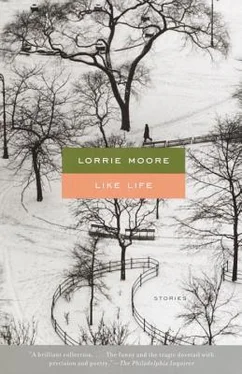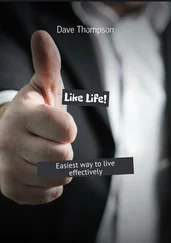Millie shrugged back and walked past him into the kitchen. Hane followed her and stood in the doorway.
“I guess I’m not the right sort of person for him,” he said. “I’m not a friendly man by nature. That’s what he needs.” Hane took off his glasses and cleaned them on the hem of his shirt.
“You’re a stack of apologies,” said Millie, kissing him on the cheek. “Here. Squash this can.” She bent over and put a rinsed and label-less can near his shoe. Hane lifted his foot and came down on it with a bang.
THE NEXT MORNING was Friday, and John Spee wanted to go into the city again. Millie drove him to catch the ten-o-two. “Have a nice time,” she said to him on the platform. “I’ll pick you up tonight.” As the train pulled up, steamy and deafening, she reminded him again about the half-price tickets for Broadway shows.
Back at the house, Millie got out the Hoover and began vacuuming. Hane, who had no classes on Friday, sat in the living room doing a crossword puzzle. Millie vacuumed around his feet. “Lift up,” she said.
In John Spee’s close and cluttered room she vacuumed the sills, even vacuumed the ceiling and the air, before she had to stop. All around the floor there were matchbooks from Greek coffee shops and odd fliers handed out on the street: Live Eddie; Crazy Girls; 20 % off Dinner Specials, now until Easter. Underwear had been tossed on the floor, and there were socks balled in one corner of the desk.
Millie flicked off the Hoover and began to tidy the desktop. This was at one time to have been her business headquarters, and now look at it. She picked up the socks and noticed a spiral notebook underneath. It looked a little like a notebook she had been using for her correspondence course, the same shade of blue, and she opened it to see.
On the first page was written, Crazy People I Have Met in America. Underneath there was a list.
1. Asian man in business suit waiting on subway platform. Screaming.
2. Woman in park walking dog. Screaming. Tells dog to walk like a lady.
3. In coffee shop, woman with food spilling out of her mouth. Yells at fork.
Millie closed the notebook quickly. She was afraid to read on, afraid of what number four might be, or number five. She put the notebook out of her mind and moved away from the desk, unplugged the Hoover, wound up the cord, then collected the odd, inside-out clumps of clothes from under the cot and thought again of her garbage business, how she had hoped to run it out of this very room, how it seemed now to have crawled back in here — her poor little business! — looking a lot like laundry. What she had wanted was garbage, and instead she got laundry. “Ha!” She laughed out loud.
“What?” called Hane. He was still doing the crossword in the living room.
“Not you,” said Millie. “I’m just going to put some things in the wash for John.” She went downstairs to the laundry room, with its hampers of recyclable rags, its boxes of biodegradable detergent, its cartons of bottles with the labels soaked off them, the bags of aluminum foil and tins. This was an office, in a way, a one-woman room: a stand against the world. Or for the world. She meant for the world.
Millie flicked on the radio she kept propped on the dryer. She waited through two commercials, and then the news came on: The garbage barge was heading back from Louisiana. “I’ll bet in that garbage there’s a lot of trash,” she wagered aloud. This was her distinction between garbage and trash, which she had explained many times to Hane: Garbage was moist and rotting and had to be plowed under. Trash was primmer and papery and could be reused. Garbage could be burned for gas, but trash could be dressed up and reissued. Retissued! Recycled Kleenex, made from cheap, recyclable paper — that was a truly viable thing, that was something she had hoped to emphasize, but perhaps she had not highlighted it enough in her initial materials. Perhaps people thought she was talking about garbage when she was talking about trash. Or vice versa. Perhaps no one had understood. Certainly, she had neglected to stress her best idea, the one about subliminal advertising on soap operas: having characters talk about their diseases and affairs at the same time that they peeled labels off cans and bundled newspapers. She was sure you could get programs to do this.
She turned the washer dial to Gentle and pushed it in. Warm water rushed into the machine like a falls, like a honeymoon, recycled, the same one, over and over.
WHEN MILLIE picked John up at the station, he told her about the buildings again.
“You probably didn’t get a chance to see a play, then,” said Millie, but he didn’t seem to hear her.
“Going in tomorrow to look some more,” he said. He flicked his lighter until it lit. He smoked nervously. “Great cars there, too.”
“Well, wonderful,” said Millie. But when she looked at him there was a grayness in his face. His life seemed to be untacking itself, lying loose about him like a blouse. A life could do that. Millie thought of people in the neighborhood she might introduce him to. There was a boy of about twenty-two who lived down the street. He worked at a lawn and seed company and seemed like the friendly sort.
“There’s someone on the street I should introduce you to,” she said. “He’s a boy about your age. I think you’d like him.”
“Really don’t want to meet anyone,” he said. He pronounced it mate. “Unless I off to.”
“Oh, no,” said Millie. “You don’t off to.” Sometimes she slipped accidentally into his accent. She hoped it made him feel more at home.
In the morning she drove him again to the station for the ten-o-two train. “I’m getting fond of this little jaunt every day,” she said. She smiled and meant it. She threw her arms around the boy, and this time he kissed her back.
AT MIDNIGHT that same day, Ariel phoned from Europe. She was traveling through the Continent — English universities had long spring vacations, a month, and she had headed off to France and to Italy, from where she was calling.
“Venice!” exclaimed Millie. “How wonderful!”
“That’s just great, honey,” said Hane on the bedroom extension. He didn’t like to travel much, but he didn’t mind it in other people.
“Of course,” said Ariel, “there’s an illusion here that you are separate from the garbage. That the water and food are different from the canal sewage. It’s a crucial illusion to maintain. A psychological passport.”
A psychological passport! How her daughter spoke! Children just got so far away from you. “What’s the food like?” asked Millie. “Are you eating a lot of manicotti?”
“Swamp food. Watercress and dark fishes.”
“Oh, I so envy you,” said Millie. “Imagine, Hane, being in Venice, Italy.”
“How’s John Spee?” asked Ariel, changing the subject. Often when she phoned her parents, they each got on separate extensions and just talked to each other. They discussed money problems and the other’s faults with a ferocity they couldn’t quite manage face to face.
“All right,” said Millie. “John is out taking a walk right now around the neighborhood, though it’s a little late for it.”
“He is? What time is it?”
“It’s about midnight,” said Hane on the other extension. He was in his pajamas, under the covers.
“Gee, I miscalculated the time. I hope I didn’t wake you guys up.”
“Of course not, honey,” said Millie. “You can phone anytime.”
“So it’s midnight and John Spee’s walking around in that depressing suburban neighborhood? How frightening.” Ariel’s voice was staticky but loud. The thoughtless singsong of her words sunk its way into Millie like something both rusty and honed. “Is he alone?”
Читать дальше












